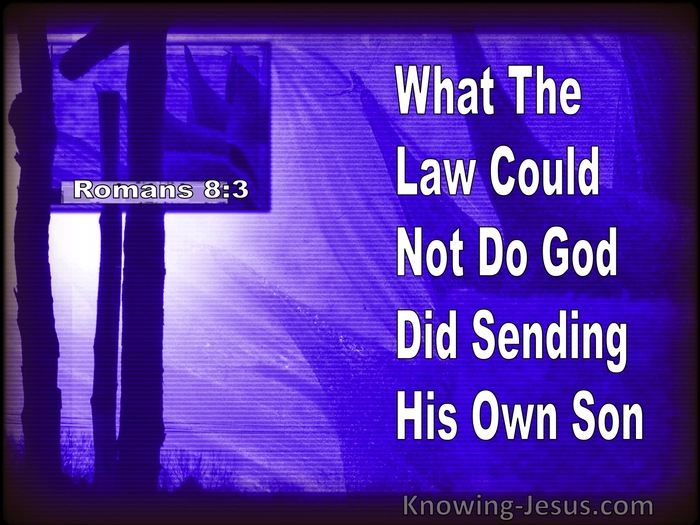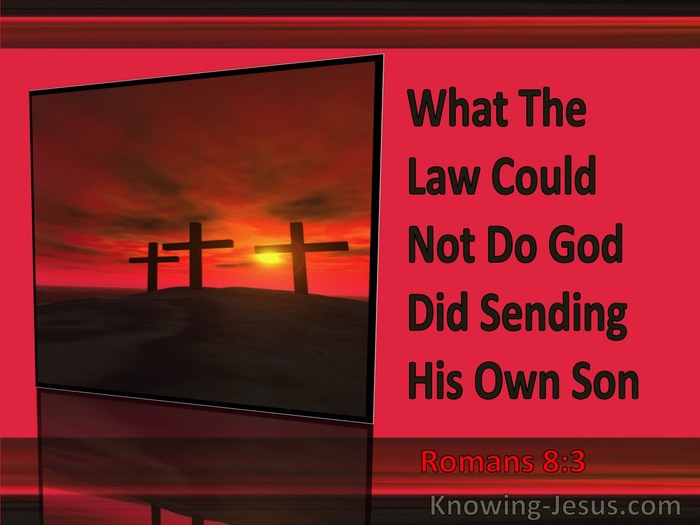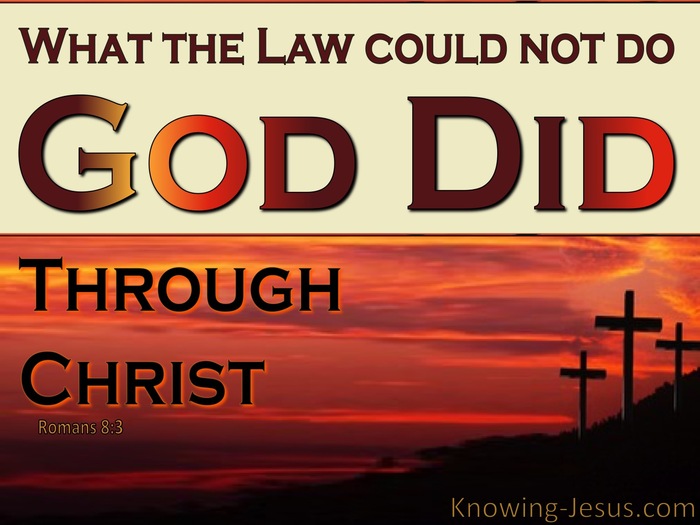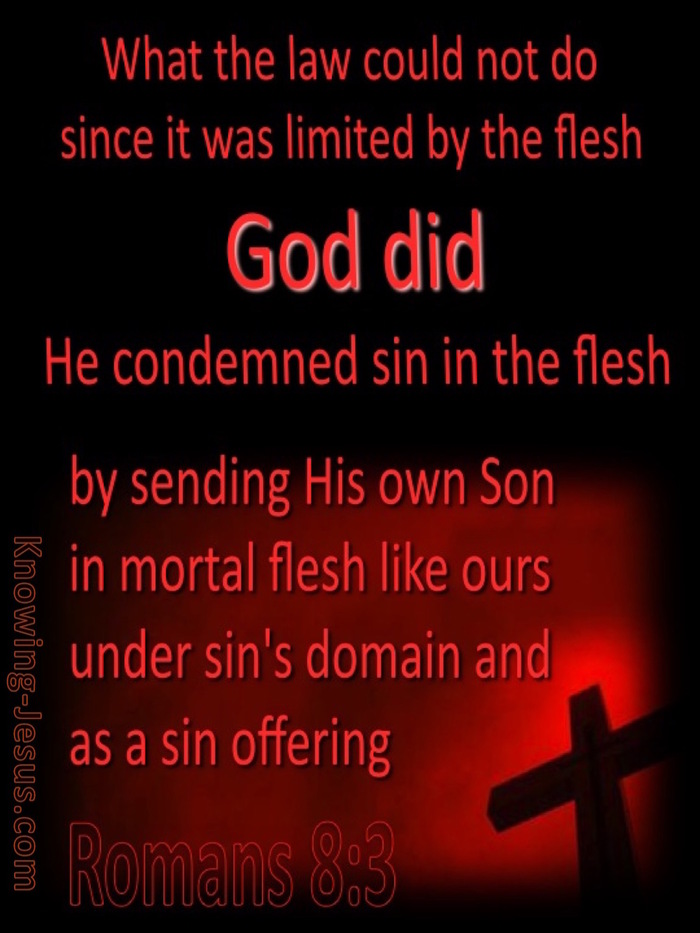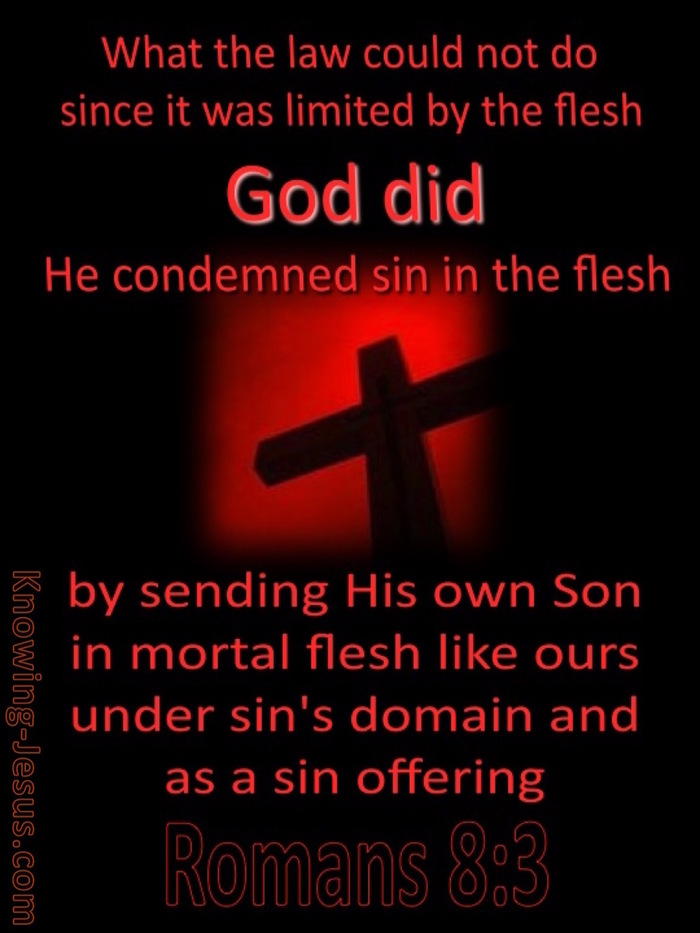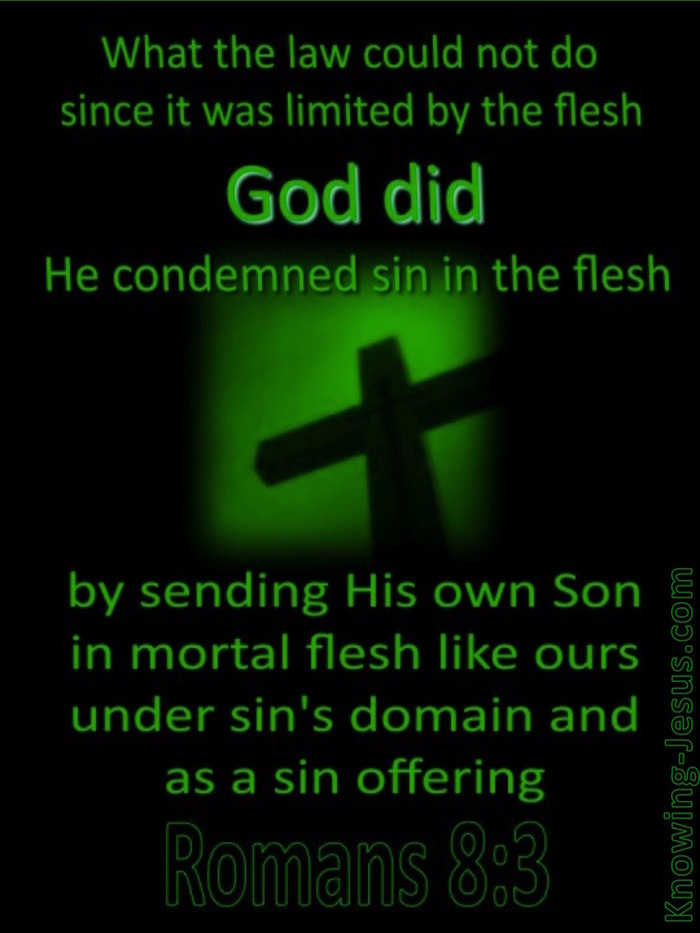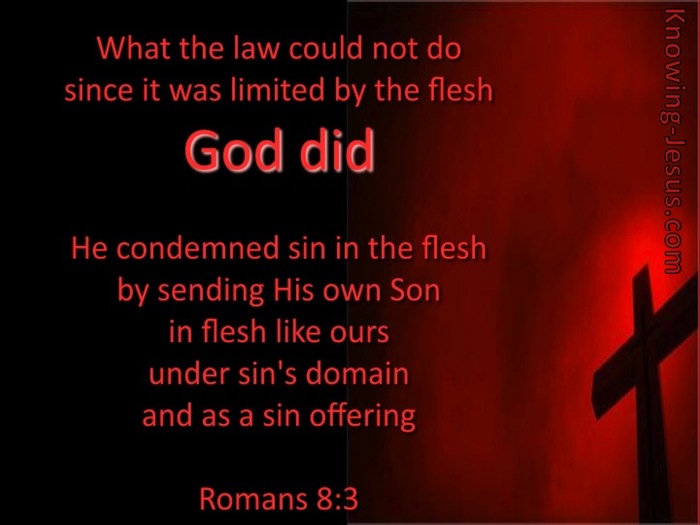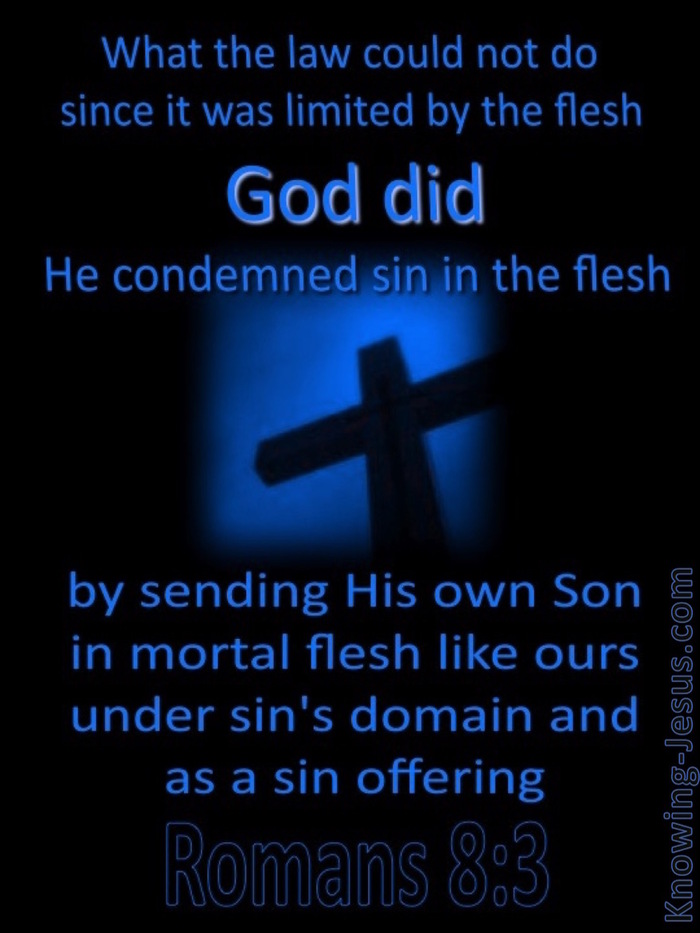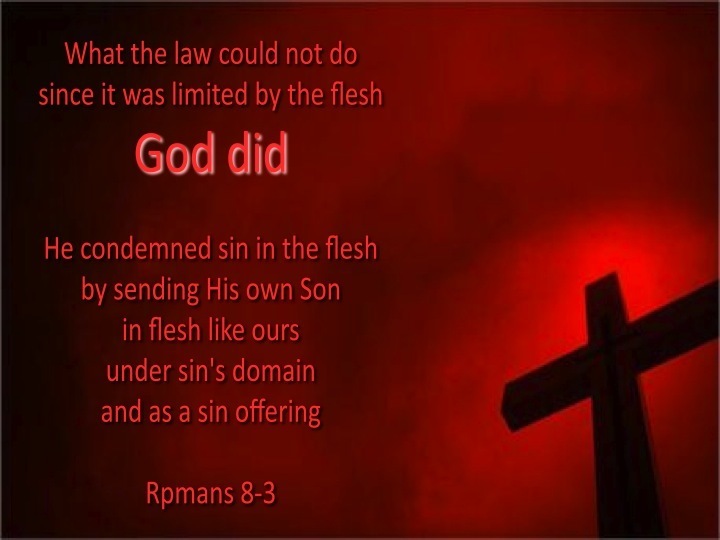Parallel Verses
Williams New Testament
For though the law could not do it, because it was made helpless through our lower nature, yet God, by sending His own Son in a body similar to that of our lower nature, and as a sacrifice for sin, passed sentence upon sin through His body,
New American Standard Bible
For
King James Version
For what the law could not do, in that it was weak through the flesh, God sending his own Son in the likeness of sinful flesh, and for sin, condemned sin in the flesh:
Holman Bible
What the law could not do
International Standard Version
For what the Law was powerless to do in that it was weakened by the flesh, God did. By sending his own Son in the form of humanity, he condemned sin by being incarnate,
A Conservative Version
For the impotence of the law, in that it was weak because of the flesh, God, having sent his own Son in a form of flesh of sin, and concerning sin, condemned sin in the flesh,
American Standard Version
For what the law could not do, in that it was weak through the flesh, God, sending his own Son in the likeness of sinful flesh and for sin, condemned sin in the flesh:
Amplified
For what the Law could not do [that is, overcome sin and remove its penalty, its power] being weakened by the flesh [man’s nature without the Holy Spirit], God did: He sent His own Son in the likeness of sinful man as an offering for sin. And He condemned sin in the flesh [subdued it and overcame it in the person of His own Son],
An Understandable Version
For what the law was not able to do [for mankind], since it was [too] weak [to deliver them from condemnation] because fleshly people [were unable to obey it perfectly], God condemned sin in the flesh [i.e., sin was declared evil and its power over man broken]. God did this by sending His own Son in a body like sinful man's, and to destroy sin,
Anderson New Testament
For what the law could not do, because it was weak through the flesh, God has done, who, sending his own son in the likeness of sinful flesh, and for a sin-offering, condemned sin in the flesh,
Bible in Basic English
For what the law was not able to do because it was feeble through the flesh, God, sending his Son in the image of the evil flesh, and as an offering for sin, gave his decision against sin in the flesh:
Common New Testament
For what the law could not do, in that it was weakened through the flesh, God did by sending his own Son in the likeness of sinful flesh, and for sin: he condemned sin in the flesh,
Daniel Mace New Testament
God having sent his own son invested with a body like that of sinful men, as a sacrifice for sin, thereby destroyed its power; which the law could not effect, human nature being in such a corrupted state.
Darby Translation
For what the law could not do, in that it was weak through the flesh, God, having sent his own Son, in likeness of flesh of sin, and for sin, has condemned sin in the flesh,
Godbey New Testament
For there was an impotency of the law, in which it was weak through depravity, God having sent his own Son in the likeness of the sin of depravity and for sin, condemned sin in depravity:
Goodspeed New Testament
For though it was impossible for the Law to do it, hampered as it was by our physical limitations, God, by sending his own Son in our sinful physical form, as a sin-offering, put his condemnation upon sin through his physical nature,
John Wesley New Testament
For what the law could not do, in that it was weak through the flesh, God hath done: sending his own Son in the likeness of sinful flesh, to be a sacrifice for sin, he hath condemned sin in the flesh:
Julia Smith Translation
For the impossibility of the law, in that it was weak by the flesh, God having sent his own Son in the likeness of the flesh of sin, and for sin, condemned sin in the flesh:
King James 2000
For what the law could not do, in that it was weak through the flesh, God sending his own Son in the likeness of sinful flesh, and for sin, condemned sin in the flesh:
Lexham Expanded Bible
For what [was] impossible for the law, in that it was weak through the flesh, God [did]. [By] sending his own Son in the likeness of sinful flesh and concerning sin, he condemned sin in the flesh,
Modern King James verseion
For what the law could not do, in that it was weak through the flesh, God sending his own Son in the likeness of sinful flesh, and for sin, condemned sin in the flesh;
Modern Spelling Tyndale-Coverdale
For what the law could not do, inasmuch as it was weak because of the flesh - that performed God, and sent his son in the similitude of sinful flesh, and by sin damned sin in the flesh;
Moffatt New Testament
For God has done what the Law, weakened here by the flesh, could not do; by sending his own Son in the guise of sinful flesh, to deal with sin, he condemned sin in the flesh,
Montgomery New Testament
For God has done what the Law could not do, weakened as it was by flesh. By sending his own Son in the likeness of sinful flesh, and on account of sin, he condemned sin in the flesh;
NET Bible
For God achieved what the law could not do because it was weakened through the flesh. By sending his own Son in the likeness of sinful flesh and concerning sin, he condemned sin in the flesh,
New Heart English Bible
For what the law could not do, in that it was weak through the flesh, God did, sending his own Son in the likeness of sinful flesh and for sin, he condemned sin in the flesh;
Noyes New Testament
For what the Law could not do, in that it was weak through the flesh, God hath done, who on account of sin sent his own Son in the likeness of sinful flesh, and passed sentence of condemnation on sin in the flesh;
Sawyer New Testament
For what the law could not do because it was weak through the flesh, God having sent his Son in the likeness of sinful flesh, and for sin, condemned the sin in the flesh,
The Emphasized Bible
For, what was impossible by the law in that it was weak through the flesh, God, by sending his own Son in the likeness of sinful flesh and concerning sin, condemned sin in the flesh,
Thomas Haweis New Testament
For that which was impossible by the law, inasmuch as it was impotent through the flesh, God having sent his own Son in the likeness of sinful flesh, and for sin, condemned sin in that flesh:
Twentieth Century New Testament
What Law could not do, in so far as our earthly nature weakened its action, God did, by sending his own Son, with a nature resembling our sinful nature, to atone for sin. He condemned sin in that earthly nature,
Webster
For what the law could not do, in that it was weak through the flesh, God, sending his own Son in the likeness of sinful flesh, and for sin, condemned sin in the flesh:
Weymouth New Testament
For what was impossible to the Law--powerless as it was because it acted through frail humanity--God effected. Sending His own Son in a body like that of sinful human nature and as a sacrifice for sin, He pronounced sentence upon sin in human nature;
World English Bible
For what the law couldn't do, in that it was weak through the flesh, God did, sending his own Son in the likeness of sinful flesh and for sin, he condemned sin in the flesh;
Worrell New Testament
For, what was impossible under law, wherein it was weak through the flesh. God, sending His Own Son in likeness of sinful flesh, and, respecting sin, condemned sin in the flesh;
Worsley New Testament
For that which was impossible for the law to do, and in which it was weak through the corruption of the flesh, God by sending his own Son in the likeness of sinful flesh to be a sacrifice for sin, hath done; that is, hath condemned sin in the flesh:
Youngs Literal Translation
for what the law was not able to do, in that it was weak through the flesh, God, His own Son having sent in the likeness of sinful flesh, and for sin, did condemn the sin in the flesh,
Themes
The atonement » Has delivered saints from the » Power of sin
Condemnation » Jesus Christ condemning sin
death » What frees you from death
Holy spirit » Those that follow after the spirit
Justification before God » Under the gospel » Is not of works
Law » Christ being the end of the law
Law » Bondage of » Insufficient
Law » Who has fulfilled the law
the Law of moses » Could not give righteousness and life
the Law of moses » Was not the manifestation of the grace of God
Interlinear
En
ἐν
En
ἐν
En
in, by, with, among, at, on, through,
in, by, with, among, at, on, through,
Usage: 2128
Usage: 2128
Astheneo
Dia
heautou
Peri
Hamartia
ἁμαρτία
Hamartia
Usage: 143
Devotionals
Devotionals about Romans 8:3
Devotionals containing Romans 8:3
References
Hastings
Morish
Word Count of 37 Translations in Romans 8:3
Prayers for Romans 8:3
Verse Info
Context Readings
Set Free From The Law Of Sin And Death
2 For the life-giving power of the Spirit through union with Christ Jesus has set us free from the power of sin and death. 3 For though the law could not do it, because it was made helpless through our lower nature, yet God, by sending His own Son in a body similar to that of our lower nature, and as a sacrifice for sin, passed sentence upon sin through His body, 4 so that the requirement of the law might be fully met in us who do not live by the standard set by our lower nature, but by the standard set by the Spirit.
Names
Cross References
Acts 13:39
and that through union with Him every one of you who believes is given right standing with God and freed from every charge from which you could not be freed by the law of Moses.
2 Corinthians 5:21
He made Him who personally knew nothing of sin to be a sin-offering for us, so that through union with Him we might come into right standing with God.
Hebrews 10:14
For by that one sacrifice He has made perfect for all time those who are consecrated to Him.
Philippians 2:7
but He laid it aside as He took on the nature of a slave and became like other men.
Hebrews 10:1-10
For since the law cast only a shadow of the blessings to come and did not possess the reality itself of those blessings, the priests with the same sacrifices that are perpetually offered year after year cannot make perfect those who come to worship.
Mark 15:27
They crucified two robbers along with Him, one at His right and one at His left.
John 1:14
So the Word became human and lived a little while among us, and we actually saw His glory, the glory of One who is an only Son from His Father, and He was full of spiritual blessing and truth.
John 3:14-17
And just as Moses in the desert lifted the serpent on the pole, the Son of Man must be lifted up,
John 9:24
So a second time they called the man who had been blind, and said to him, "Give God the praise; we know this man is a sinner."
Romans 3:20
Because no human creature can be brought into right standing with God by observing the law. For all the law can do is to make men conscious of sin.
Romans 6:6
for we know that our former self was crucified with Him, to make our body that is liable to sin inactive, so that we might not a moment longer continue to be slaves to sin.
Romans 7:5-11
For when we were living in accordance with our lower nature, the sinful passions that were aroused by the law were operating in the parts of our bodies to make us bear fruit that leads to death.
Romans 8:32
Since He did not spare His own Son but gave Him up for us all, will He not with Him graciously give us everything else?
Romans 9:3
for I could wish myself accursed, even cut off from Christ, for the sake of my brothers, my natural kinsmen.
Galatians 3:13
Christ ransomed us from the curse of the law by becoming a curse for us -- for the Scripture says, "Cursed be everyone who is hanged on a tree" --
Galatians 3:21
Is the law then contrary to God's promises? Of course not. For if a law had been given that was able to impart life, surely, then, right standing would have come through law.
Galatians 4:4-5
but when the proper time had come, God sent His Son, born of a woman, born subject to law,
Hebrews 2:14
Since then the children mentioned share our mortal nature, He too took on Himself a full share of the same, in order that He by His death might put a stop to the power of him who has the power of death, that is, the devil,
Hebrews 2:17
Therefore He had to be made like His brothers, so that He could be a sympathetic High Priest, as well as a faithful one, in things relating to God, in order to atone for the people's sins.
Hebrews 4:15
For we do not have a High Priest who is incapable of sympathizing with us in our weaknesses, but we have One who was tempted in every respect as we are, and yet without committing any sin.
Hebrews 7:18-19
Indeed, the rescinding of a previous regulation takes place, because it was weak and ineffective --
Hebrews 10:12
But this One offered up once for all and for all time one sacrifice for sins, and once for all took His seat at God's right hand,
1 Peter 2:24
He bore our sins in His own body on the cross, that we might die to sin and live to uprightness. By His wounds you have been healed,
1 Peter 4:1-2
So then, since Christ has suffered in our physical form, you too must arm yourselves with the same determination. For whoever suffers in his physical form has done with sin,
1 John 4:10-14
In this way is seen the true love, not that we loved God but that He loved us and sent His Son to be the atoning sacrifice for our sins.
